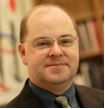 This past Friday was a memorable day for Marquette Intellectual Property & Technolgy Program. Professor Mark A. Lemley, the William H. Neukom Professor of Law at Stanford Law School, the Director of the Stanford Program in Law, Science and Technology, and a founding partner of Durie Tangri LLP, delivered the Distinguished Annual Hon. Helen Wilson Nies Lecture in Intellectual Property, “Can the Patent Office Be Fixed?”
This past Friday was a memorable day for Marquette Intellectual Property & Technolgy Program. Professor Mark A. Lemley, the William H. Neukom Professor of Law at Stanford Law School, the Director of the Stanford Program in Law, Science and Technology, and a founding partner of Durie Tangri LLP, delivered the Distinguished Annual Hon. Helen Wilson Nies Lecture in Intellectual Property, “Can the Patent Office Be Fixed?”
In the Conference Center of Marquette’s Eckstein Hall, which was filled with students, alumni, faculty, and local practitioners, Professor Lemley stressed that the United States Patent and Trademark Office (USPTO) faces primarily two problems in promoting innovation policy. On the one hand, the USPTO must contend with a backlog of around 700,000 patent applications that have not yet even been examined, let alone granted or denied. This may result in three- and five-year waits before the USPTO renders a decision on an application, which may prove detrimental for certain sectors in which technology develops at a more rapid pace, such as the software industry. On the other hand, the USPTO has granted a not insignificant number of patents of questionable validity and quality.
Professor Lemley listed a number of proposals aimed at addressing both of these problems, noting the pros and cons of each proposal. First, spending more money on patent examination may not be cost-justified. Other responses, like prevent fee diversion and retain more experienced patent examiners, may be somewhat beneficial, but the empirical research regarding examiner habits at the USPTO suggests these proposals would be of little consequence. Instead, Professor Lemley argued, the incentives that drive these habits need to be recalibrated. Additionally, the best options are those that allow patent applicants and their competitors to determine which patent applications should be given priority, such as tiered review and adversarial challenges to granted patents. In the end, concluded Professor Lemley, no single proposal can solve the USPTO’s problems by itself. But each proposal, especially those in which private parties can signal the USPTO that some patents deserve more attention than others, can at least make a difference in the USPTO’s backlog and the bad patents it issues.
The Marquette Intellectual Property & Technology Program is deeply grateful to Professor Lemley for visiting our school, our students, and our legal community. After several years of teaching, I can truly say that Mark Lemley embodies the best qualities of the greatest academic and lawyer, and is an extraordinary mentor and an example for an entire generation of intellectual property academics and practitioners. Thank you, Mark, so very much for making the first Nies Lecture in Marquette University Law School’s magnificent new building a truly unique and memorable day!
